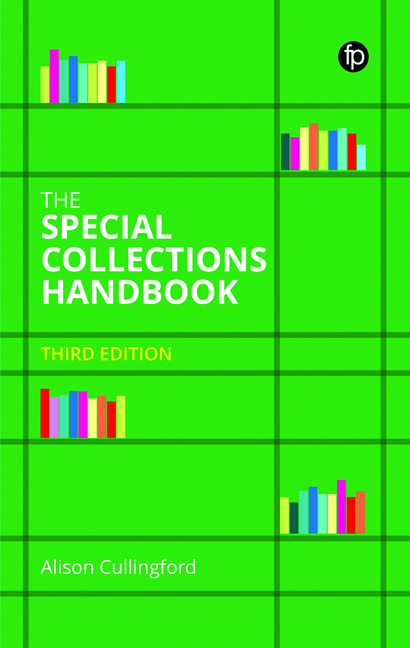Book contents
14 - Influencing and Fundraising for Special Collections
Published online by Cambridge University Press: 28 April 2022
Summary
Introduction
Finally, we consider fundraising and influencing, vital for all Special Collections activities. This chapter will:
1 Introduce advocacy.
2 Discuss the power of persuasion and the importance of inreach.
3 Discuss coping with threats to collections.
4 Explore the value for advocacy of impact and awards.
5 Introduce fundraising and explain its importance.
6 Outline fundraising issues.
7 Discuss sources of Special Collections funding: public programmes, trusts and foundations, individual giving, sponsorship and income generation.
8 Consider fundraising strategy.
9 Suggest further reading and useful websites.
Introducing advocacy
The future of special collections is advocacy… . In a time of hard choices, we will be increasingly called upon to defend the relevance of our work and the resources it demands. Special collections cannot survive merely as a prestigious ornament to the university; we will need to articulate the centrality of our collections to the university's mission.
(Overholt, 2013, 18–19)A common problem for Special Collections is that they excel at their core tasks, providing great collections care and user services, but their work is either unknown or not valued by senior managers and other stakeholders.
Activities that may once have been accepted as nice-to-have but not especially relevant to mission cannot be justified in a managerial and marketised environment. At best, they face severe budget cuts; the worst could be closure to the public and dispersal of collections.
The increased spend and collaboration required for digital preservation and curation make the Special Collections budget more visible and complex.
It is imperative therefore that Special Collections focus on advocacy: a form of marketing that entails visibly aligning with corporate mission. In other words, highlighting positive contributions and making the case for improvements in ways that connect to the concerns of influential internal audiences.
Missions differ. In a cathedral, spiritual ministry and stewardship of heritage are most important. In a university, the student experience and research support might be key drivers. In all situations, the case for Special Collections will highlight their unique offer, their value in widening access and role in compliance with legislation, such as copyright and data protection.
- Type
- Chapter
- Information
- The Special Collections Handbook , pp. 325 - 354Publisher: FacetPrint publication year: 2022



